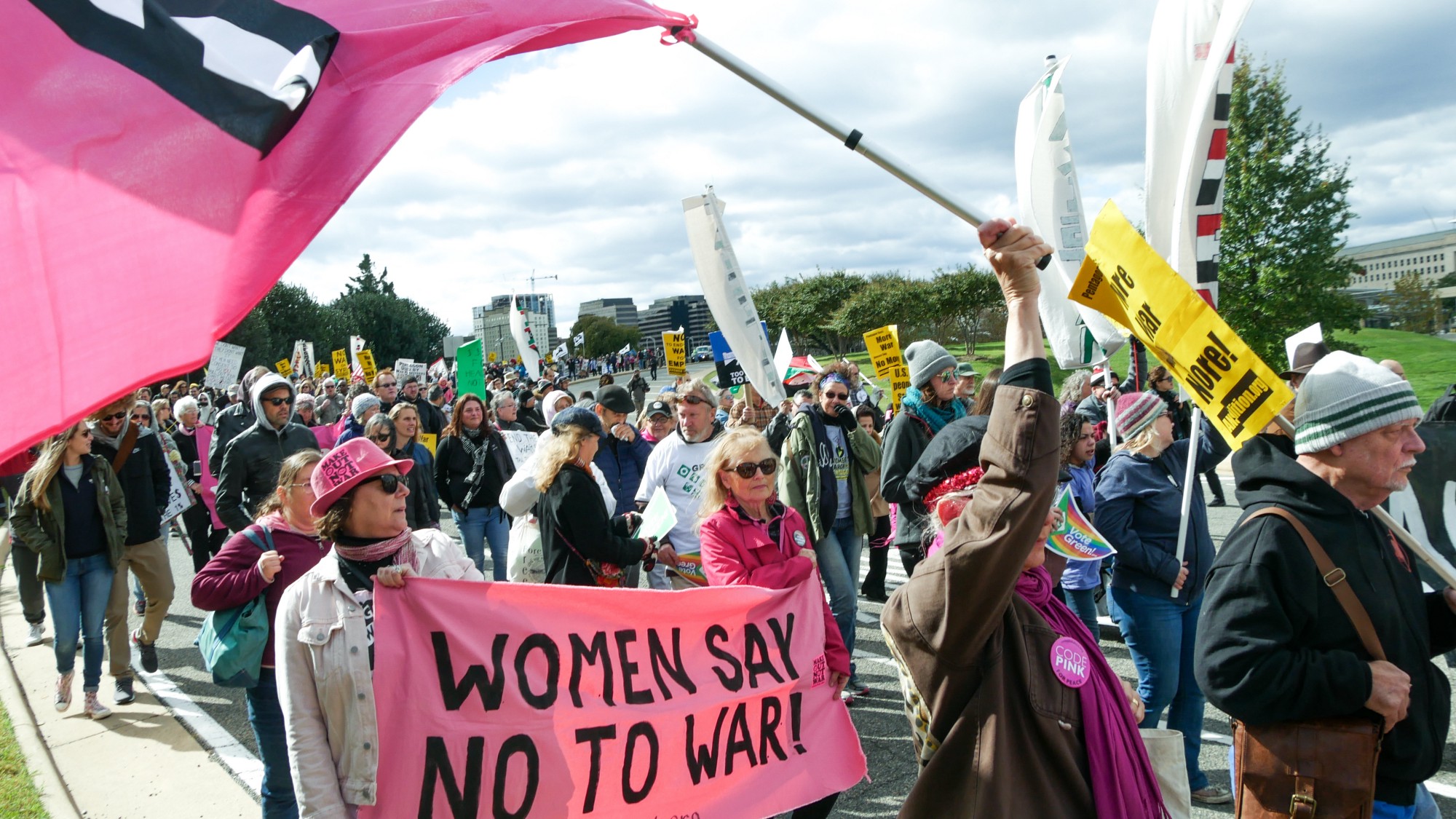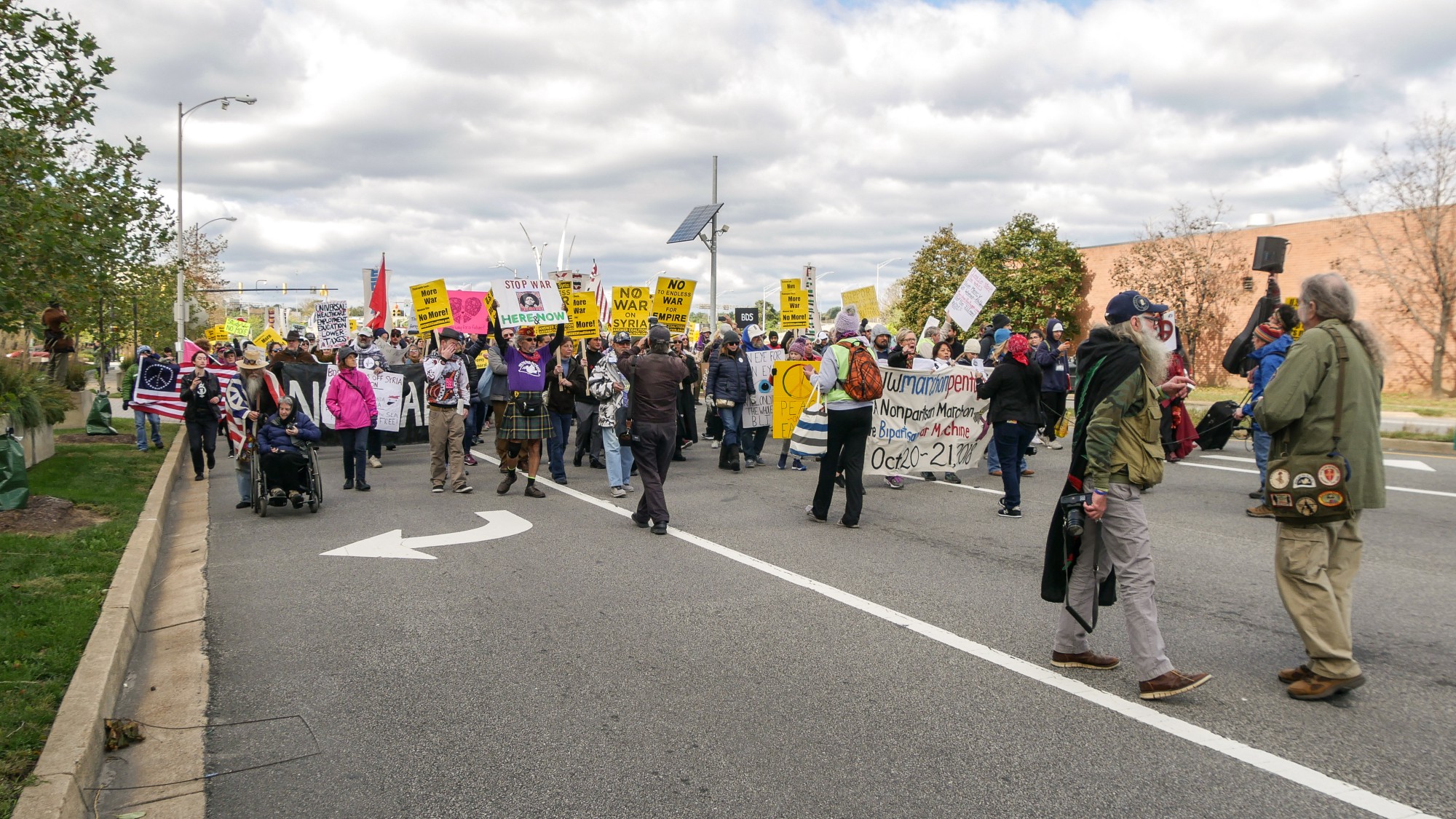Above Photo: Protesters shouting “Shut it Down!” across from the Pentagon
The Women’s March on the Pentagon took place on October 20–21, 2018. The antiwar workshops, rally, and march were a call for women and their allies to organize on the 51st anniversary of the 1967 antiwar events in Washington D.C. during which 50,000 people tried to “levitate the Pentagon.”
While we failed yet again to levitate the five-sided shrine to endless war, the 2018 March on the Pentagon was a potent example of what People Power looks like when it is directed against the U.S. bipartisan war machine.
Hopefully, this essay will inspire those sitting on the sidelines to actively demand an end to U.S. military aggression abroad, and for all of us to keep marching forward.

My first thought in reflecting about last Sunday is that the march dispelled the myth of the “angry left mob” that is often equated to white nationalist activities in the U.S.
Although we were essentially protesting war crimes, one of the most serious issues of our time, there wasn’t any violence or agitation toward the police or the public. Quite the opposite — the protest was a place where a community of like-minded individuals from all walks of life came to connect over a common goal:
STOP THE WARS, “CORPORATE WAR WHORES!”
 She pulled out a poem about Trump and read it to me (she made sure to apologize for the language in it).
She pulled out a poem about Trump and read it to me (she made sure to apologize for the language in it).
It was an honor to march alongside activists from CODEPINK, Veterans for Peace, and other organizations at the forefront of the antiwar movement in the U.S.
If this is the first time you heard about the march, perhaps you should ask why it wasn’t covered on mainstream media. Where were the Democrats? The anti-war Republicans? Where were MSNBC, Rachel Maddow, and Chuck Todd? Where were the rebels of the Intellectual Dark Web?
We routinely see articles about “centrist” and “classically liberal” YouTube commentators who are presented as brave and courageous for raising “messy” questions in the mainstream. Yet, when it comes to issues of war — you know, like when a bus full of Yemeni kids gets bombed with a U.S. missile — those same pundits are hesitant to shed light on U.S. military aggression or predatory capitalism.
To this group of safely provocative media commentators and pundits I’d also add the motivational gurus, tech entrepreneurs, and “thought leaders” who never seem to take a stand on U.S. military aggression, yet they are always eager to compare progressive demands with “Venezuela” and argue against initiatives with wide public support, such as “Medicare for All.”
The message loudly voiced at the March on the Pentagon, on the other hand, made the People’s antiwar case crystal clear :
“Pentagon Says: More War, Women Say: No More!”
“The War Economy is Immoral”
“Another Veteran Against Perpetual War for Profit”
“No War”
“U.S. lies, people die!”
There are many reasons why such events are filtered from the nightly news — elites don’t want to lose weapon contracts, or be perceived as war criminals, or have to deal with the consequences of false intelligence. But this mindset only helps war profiteers who are betting on the next media distraction to sweep U.S.-backed atrocities under the rug.
This is very much a question of what information we are told to dwell on and what actually needs to be done. Although being against killing civilians in far away countries seems like a no brainer, there are few voices in the mainstream raising the issue on a consistent basis.
 For example, do you know where your senators stand on the U.S.-backed, Saudi-led war in Yemen or the Israeli occupation of Palestine? Ask yourself why the Democrats, who are supposedly antiwar, keep giving the Trump administration more money for the military.
For example, do you know where your senators stand on the U.S.-backed, Saudi-led war in Yemen or the Israeli occupation of Palestine? Ask yourself why the Democrats, who are supposedly antiwar, keep giving the Trump administration more money for the military.
Think about the incessant focus on “Russian intervention” in the media and how it has been used to overshadow other pressing issues while heightening tensions with Russia. Now, two years after the 2016 elections, Politico says the public should “prepare for disappointment.”
In the meantime, the atrocities in Yemen have devastated the country, putting it into a “clear and present danger” of massive famine, according to NPR. Yet, corporate media dedicated significantly more time to the tales of Russian troll farms than they did on the war in Yemen and other war crimes around the world.
This is why coming together to take a stand against perpetual war should be celebrated.
 The game of the 1% is to chop and screw us into simple identities that can be pitted against each other in the menagerie of the mainstream press.
The game of the 1% is to chop and screw us into simple identities that can be pitted against each other in the menagerie of the mainstream press.
What would happen if media truly represented our collective knowledge and wisdom? Would we need flashy animation and BREAKING NEWS to form our opinions? Would we press our representatives to finally take a stand against endless war?




“Our demands are simple,” states the official website of the March. “The complete end to the wars abroad; closure of foreign bases; dramatically slash the Pentagon budget to fund healthy social programs here at home: the only good empire is a gone empire.”

 Spoken poetry from Eleanor Goldfield.
Spoken poetry from Eleanor Goldfield.
So, the next time you hear about an antiwar protest near you — join in.
The message you hear is not one that is encouraged much in official culture, but it is more universal and American than what we are made to believe.



Click here to learn about the team that organized the March.
In the video below, Cindy Sheehan talks about the political decisions that brought us to this critical moment in U.S. history and the place of the antiwar movement in our society.











